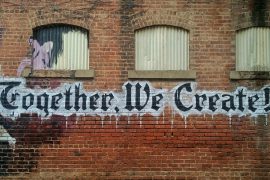Creativity is a process of exploration, experimentation, and taking chances which is vital in teaching and learning. Such exploration is related to generative playful processes of learning, and has been robustly demonstrated to be an essential feature of innovation in creative industries including the arts, film, and science. The Australian Universities Accord Final Report identifies creativity is a necessary skill for graduates, and creativity features in the University’s graduate qualities for award courses in the form of ‘inventiveness’. In the University’s researcher graduate qualities, inventiveness specifically includes creativity, along with a willingness to take risks.
While taking risks may feel too taxing when this time of so much global upheaval has perhaps resulted in people craving certainty, and squiggly processes of playful exploration may seem irrelevant when there is pressure for universities to deliver outcomes, it is worth pointing out that creativity is not a luxury. Creativity is vital to people being equipped to engage with situations and challenges as yet unforeseen, and for imagining and making conditions and environments conducive to equity:
“…one of the things we hear about sometimes in the research is we hear teachers say ‘Well they’re going to have to do this when they go to work so I’m just preparing them for the hard challenges they’re going to face at work’, that’s not our role and actually quite the opposite, our Educational Systems should be thinking more future focused than that we should be thinking about how we want to create the next generation of managers and leaders who will create more inclusive workplaces.” Professor Mollie Dollinger
While creativity doesn’t have to involve creative practice, creative practice is perhaps one of the simplest ways for students to activate and engage with processes of creativity. These innovations employ creative practice as the foundation of learning, with multidimensional results.
Associate Professor Fiona Allon: enhancing relevance through creative thesis writing
Fiona Allon is Associate Professor of Gender and Cultural Studies at The University of Sydney. She is passionate about pedagogy, literacy and the incorporation of creative methodologies in higher degree research and writing.
I teach a postgraduate unit called Arguing the Point, a methods unit of study designed to help students write a higher degree by research thesis. My goal is to demystify the process of writing. In addition to helping students grasp the structure of a thesis and making the idea of writing a thesis less terrifying and more doable, I designed Arguing the Point to challenge them to consider seriously what academic writing can be. Rather than subscribing to a fixed, stable, and formulaic ‘paint-by-numbers’ method of writing a thesis, I encourage students to think creatively about alternative ways of presenting their research.
To this end, I included in the course reader a few chapters from the book Departing Radically in Academic Writing (DRAW): Alternative Approaches to Writing and Methods in Qualitative Research, by Elizabeth Mackinlay and Karen Madden, and set some of the creative writing exercises the authors recommend. This approach provided genuinely new and transformative ways of viewing academic research and writing. Rather than forcing students to conform to an ‘official’ style of disembodied and ‘neutral’ thesis writing, we consider how this style has developed and accrued the prestige it has. This then allows students to think about and explore alternative forms of writing and research that may be more personally interesting and satisfying, worthwhile, and more importantly, relevant, to the student’s own candidature and topic.
Students have given me feedback that the unit has helped them completely rethink what theoretical academic writing is and can be, and opened up the possibility of doing and writing a thesis differently, with creativity, originality and experimentation at the forefront.
Dr Alison Grove O’Grady and Dr Thomas De Angelis: pedagogy, empathy and praxis, using theatrical traditions in teacher training
Dr Alison Grove O’Grady is a Senior Lecturer at the University of Sydney, School of Education and Social Work. Her research focuses on pedagogies of empathy, as performed and action-oriented methods, to develop teachers’ understanding of their multiple identities and voices. She is a passionate learner and listener. Dr Thomas De Angelis has worked at The University of Sydney as a lecturer and tutor since 2018 and completed his PhD and Academic Fellowship with the Faculty of Arts and Social Sciences in 2025. He is also the Research Associate – Strategic Projects at the CREATE Centre, a research centre based at the University of Sydney that investigates the impact of the arts on education, health and wellbeing.
Teaching is a relational endeavour, requiring the kind of empathy that comes from teachers being able to understand students’ experiences. We created this theater-informed innovation using Stanislavsykan technical practice to create an immersive, experiential learning environment in which pre-service and early-career teachers engaged in imaginative, embodied, and participatory learning to help them enhance their relational skills. Supported by actors and held in a performance space at the Seymour Centre in Sydney, participants devised vignettes of classroom scenarios and enacted them through improvisation as a way to inhabit, explore, and understand different perspectives. In this way, participants were able to build on their existing understanding of their students and foster a more empathetic approach to teaching.
Participants reported that the activity helped them reconnect with the life stage and experiences of adolescence in ways that created genuine empathy, and an appreciation of the importance of affect in the classroom and of listening deeply to understand the life experience of the other person.
While this workshop was a discrete experience, facilitated by acting professionals, the creative arts-based ideas informing it can be usefully incorporated into other teaching contexts by devising scenario-based, small group work which invites imaginative and embodied engagement with learning experiences. Alison states, “the research is unequivocal: when you use embodied, affective, arts-rich approach you get academic engagement.”
Learn more about this project here and here.
Dr Clara Sitbon: building empathy-based intercultural literacy though slam poetry
Clara Sitbon is a Senior Lecturer in French and Francophone Studies at the University of Sydney. She is a specialist of crime fiction, but also a trained teacher of French as a Foreign Language. Over the past two years, she has been leading work on the meaningful integration of AI into the French and Francophone Studies curriculum at the University of Sydney, exploring how it can enrich student learning and support transformative teaching practices.
In FRNC3002, one of our aims is to decolonise the curriculum to foster intercultural literacy through engagement with the diverse experiences of French speakers, and the circumstances through which the language came to be spoken in a variety of places globally. The perspectives of underrepresented voices are key to this endeavour, and with firsthand accounts a powerful way to engaged with these perspectives, we use the works of Franco-Rwandan writer and hip-hop artist Gaël Faye to understand the impact of colonisation and the genocide against the Tutsi in Rwanda in contemporary France.
We designed activities and assessments which aimed to encourage students to explore personal connections with the themes in the materials as a way to develop empathy along with understanding, and finally to collaborate on creating and performing a piece of original slam poetry which articulates their relationship with the themes. In tutorials students explore vocabulary, rhyme, and gesture as tools to convey their emotion and experience and to develop it into their finished poem. In working to integrate the themes in the materials with their own responses and experiences, students learn through embodied engagement, and learning becomes a personal, collective, affective, and creative process.
The poems the students wrote and performed demonstrated critical thinking, self reflection, shifts in perspective, deep empathy, and even healing of their own past experiences.
This innovation is part of a broad unit redesign, read more here.
About everyday innovation
Everyday innovation is about small, clever, creative and caring things that teachers at Sydney are doing in their classes. The scale of focus of this series is the quotidian, the extraordinary ordinary, the things we can do at arm’s reach, are comfortably within our resources, and are experimental – the stuff we try out together with our students in the lively spaces of our classes. Small ideas, while often overlooked on the big stage of awards and such, are special because they’re sensitive to their specific contexts. They’re often the simplest to implement and can allow nimble adaptations on the fly. These ideas deserve recognition and celebration! Let us know about your, or a colleague’s, everyday innovation by emailing us at [email protected].
Read other articles in the everyday innovation series for inspiration in your own teaching.
Thanks to Michael Brewster for showing me around Sydney College of the Arts to take the photo.





